When you try to control both price and quantity
(Thanks to James Joyner for a chance to post a few stories here while he is in Quebec.)
A few weeks ago I read a story on air (it’s at the end of this podcast) that the idea of the gas tax holiday had not only foundered in Congress but that they were contemplating instead a gas tax increase. Today’s Wall Street Journal carries a headline, “Americans Cut Back Driving, Straining Highway Funding“. The problem is you are doing too much conserving, you nasty driver you.
A report to be released Monday by the Transportation Department shows that over the past seven months, Americans have reduced their driving by more than 40 billion miles. Because of high gasoline prices, they drove 3.7% fewer miles in May than they did a year earlier, the report says, more than double the 1.8% drop-off seen in April.
The cutback furthers many U.S. policy goals, such as reducing oil consumption and curbing emissions. But, coupled with a rapid shift away from gas-guzzling vehicles, it also means consumers are paying less in federal fuel taxes, which go largely to help finance highway and mass-transit systems. As a result, many such projects may have to be pared down or eliminated.
Remember when we joked “light up for the Twins” when it appeared a cigarette tax would help fund a new stadium? So at the same time you are advertising that driving big SUVs are harming your mother earth, you have to compensate for the effect of the advertising by increasing taxes to fund highway and bridge construction. This is supported by folks in the highway construction industry and the union leaders of those industries.
“We were losing ground to these incredible increases in construction costs, but then to see the erosion in driving — it’s a double whammy,” said John Horsley, executive director of the American Association of State Highway and Transportation Officials.
The government has used a tax system that says, in short, the more miles you drive the more you erode roads so you pay more. Thus a tax system that charges you a per-gallon tax. If Americans are driving fewer miles, highways should be eroding more slowly and construction should be able to slow to match this.
But transportation policy now appears to both want to control your price you pay (through taxes that discourage consumption) and the quantity of gas you consume (so that they can collect revenues enough to meet their construction plans.) Controlling both price and quantity is hardly a market solution to roads and bridges. Tolls would be a solution that returns us to a benefit principle for highway financing.

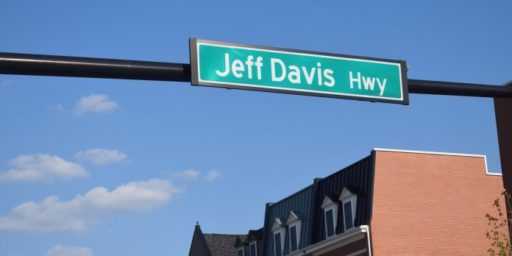
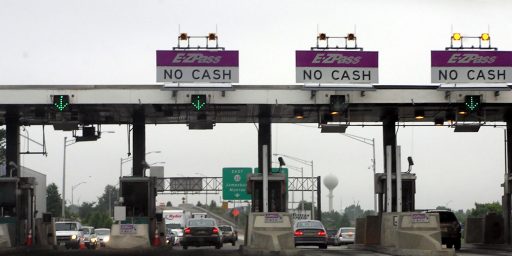
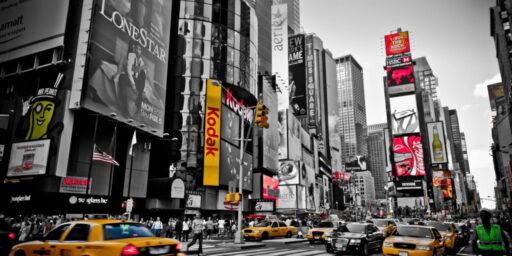
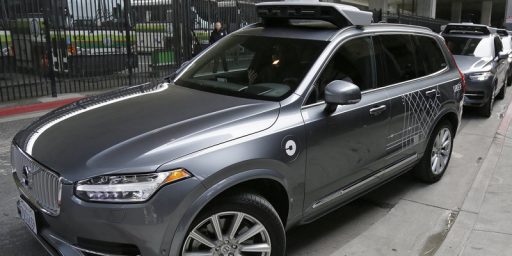
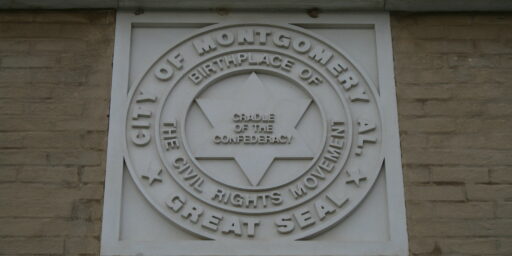
Yeah, I thought of posting on this one here, too. You beat me to the punch.
The “broken window fallacy” is apparently live and well. Reminds me of the comment that the head of the Illinois Tollway Authority made when it was suggested that all toll roads be converted to freeways: “But then you couldn’t use iPass”.
Dude, where have you been? This has been the financing scheme in the US for the past 52 years!
Even during the 1990s when petrol was dirt cheap, state highway officials in many places were pissed that the increase in fuel efficiency was keeping tax receipts down relative to the increasing demand for roads.
Yes, tolls–like the London congestion charge–provide a better mechanism for financing and dealing with the externalities of highway travel.
Additionally, Dave Wetzel of Transport for London has been advocating for annual land value taxation. Basically, this scheme taxes land owners near public goods like tube stops/highway interchanges a higher rate because their property value is enhanced by the proximity to the public good.
In the US, the current scheme for financing transport is clearly disfunctional. McCain’s idiotic plan for a gas tax holiday would make matters worse while B. Hussein–as far as I know–has no transportation policy.
There is also an environmental cost here. Many states (most?) fund pollution cleanups at gas stations through a per-gallon tax at the fuel pump. Thus, the fewer gallons consumed, the less money there is to clean-up gasoline leaks.
It’s just not a normal day in government if there’s not a crisis to deal with. Of course Hayek warned us about that.
Less driving and better fuel economy means less wear and tear on the roads but DOTs must create an sense of impending doom in order to get increased funding. In Oregon it sometimes seems the primary mission of ODOT is to get more money while fixing the roads comes second.
I’ve got an idea, adjust your budgets to the new reality and live with what you get.
I was amused at the hysterics in the headlines. Assuming US drivers have reduced driving by about 3% then the reduction in tax receipts should also be about 3%. Hardly a huge funding shortfall. This is good news as reduces need for maintenance and presumably new construction.
Ha! Ha! None of you seem to get it. Highway funding is question #16 on the hundred question IQ test the aliens are using to determine if there is intelligent life on the planet. So far, taxpayers are flunking the test.
To propose replacing gasoline taxes with tolls as a solution is just plain idiotic. It’s the same as saying there’s a difference between giving the government money with your left hand as opposed to giving it with your right hand. There is no difference (unless of course you have a vested financial interest in tollbooth operation).
How do you propose paying for road expansion and upkeep then, Mr. Wisenheimer?
Triumph, I am equally happy with gasoline taxes and/or tolls and/or general fund appropriations in any combination. What I find silly is to propose tolls as a solution to gas taxes. It is not a solution. It’s just an alternate way of doing the same thing.
Ok, there is a difference though. Gas taxes don’t directly charge people for their road usage whereas tolls do–thus the latter is more equitable. Those who directly benefit from the public good pay the price.
There is another difference. Tolls have a much greater expense to collect than taxing at the pump when you consider costs for tollbooths, equipment, & labor plus the loss of fuel economy & time due to slowdowns & congestion at those booths. Many toll-roads & -bridges have had the tolls removed before they were paid for due to unacceptable congestion.
I am not against tolls in general since, without them, many of our much needed highways & bridges could not have been built w/o them. I’m just pointing out that tolls are not a good overall option, as some toll boosters have suggested.
This is just fallout from regulation run away and melt down. When you eventually get so many regulations that you can’t keep track of what bad effects one regulation has on another or adverse effects a regulation has on other parts of the country, things start to collapse.
In addition to the obvious crisis we are facing in banking, energy, employment, education, housing, manufacturing, and immigration, many other things will not quite work right.
Ah yes, but with the apparently long-term (if not permanent) spike in gas prices, people are moving more to cars that get better mileage, thereby increasing the amount of wear & tear per gallon used, further skewing that formula. Clearly, we all need to go back to driving SUVs and big-ass caddys. For the good of the country.
Then I presume you would consider it more equitable to tax welfare recipients in order to pay them their benefits.
The problem is the fact that people are driving less. The proportional revenue loss would be virtually identical whether it be gas taxes or tolls.
Plus I don’t see any logical connection between payment and usage. If that were the case, would we have to fund the Army by taxing hunting ammunition or the Navy by taxing fishing rods?
The solution is to elect intelligent, responsible representatives who wouldn’t have to trick the public into thinking pay-as-you-go is fair. Besides money is fungible, so who knows for sure where the gas tax dollars actually are spent?
P.S. I dig your little avatar picture. Where can I find a bigger copy?
A key thing to remember is that you pay the gas tax whether you’re driving on a local street, a locally funded major arterial, or a state highway; yet in most cases only the state highway actually gets gas tax funding (this is always the case in Tejas, where the constitution requires gas tax monies not be spent on roads outside the state highway system).
In many cases, especially ours, this basically means that urban drivers (usually poorer) are subsidizing the exurban and suburban drivers, since urban areas are far more likely to maintain their own major arterial roads.
Someday we may be lucky to live in a society in which satelites monitor our vehicular usage (miles on city roads, state roads, federal roads) and then deduct automatically from our bank accounts the toll we owe to each unit of government.
Bwaa, ha, ha, haaaaaa, … And what about occupancy? Do we get a discount for carrying more than one person? Do we pay a penalty for being obese (after all heavier cars cause more wear)? Do we tax illegals in Pesos? Is there a surcharge on people making over $100K a year? Is there a senior citizen’s discount, and do children under 12 ride for free? And last but not least, do you write the skits on SNL?
The problem with a gas tax is that it’s dependant on two factors:
1) The number of miles driven
2) The gas mileage of the vehicle
A toll is much more directly related to the number of miles driven (though in some cases the presence of a toll would push people to avoid paying the toll possibly by driving local roads that are typically more roundabout when possible).
Even if the number of miles driven had stayed constant between this year and last year, gas tax revenue would more than likely be down as the average gas mileage has more than likely gone up. Maintenance and construction costs should vary with miles driven, not a combination of miles driven and average vehicular gas mileage. Tolls do a much better job of collecting based solely on number of miles driven.
That being said I’m not a huge fan of tolls for the reasons stated above (collection fees, decreased gas mileage caused in the case of backups, etc.)
But the wear from weather and time will be the same.
Wake up the masses! Yeah the ‘Gas Tax’ scam looks like most of the other tax scams…like Tobacco Taxes, Lottery Taxes, Rural Phone Tax….on & on. Their intent has nothing to do with a use or a need, it’s to get the maximum $$’s removed from the rightful owner…aka thief, stealing, thievery. We are all serfs and the victims of multi level Gov thieves.